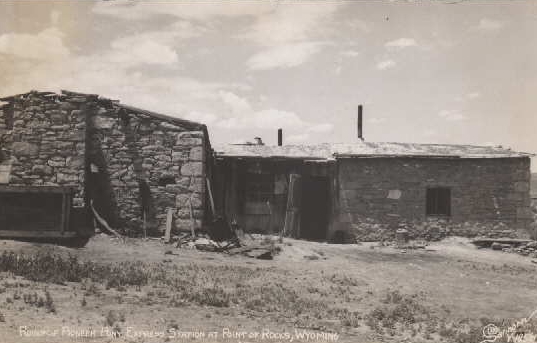
Point of Rocks Station
Point of Rocks Station, 22 miles northeast of Rock Springs and one-half
mile south of I-80, was built in 1861 or 1862 by Ben Holladay when Indian
depredations completely interdicted stage traffic on the Oregon Trail and forced
traffic further south. The move did not completely stop the problem and
the station was burned by the Indians at least once. In 1863, Overland ex-superintendent
Joseph A. "Jack" Slade held up the stage near here, killing 7 passengers, resulting in
the start of the cemetery (C.M. Russell, Holdup of the Overland Stage, below).
The Railroad reached Point of Rocks in 1868, but
for many years the town remained an important junction point for stages and freighters
going to South Pass. In 1870, a stage left twice daily for South Pass City, a jolting
15 hour ride. With the decline of South Pass City and the mines, stage service
was discontinued in 1877, and the station became a private residence and a
school.
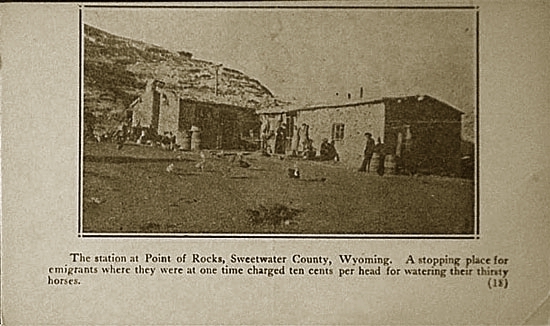
Point of Rocks Station, undated
The last resident of the station was Jim McKee who reputedly was a
member of the Hole-in-the-Wall Gang. The Union Pacific, who by then had
acquired title to the building, attempted evict him, but was thwarted by
McKee's threats of bodily harm to the railroad representive. To deter other
visitors McKee posted a smallpox warning on the door. Today, the town is little more than an interchange on
I-80 with several trailer homes, a gas station and fireworks store.
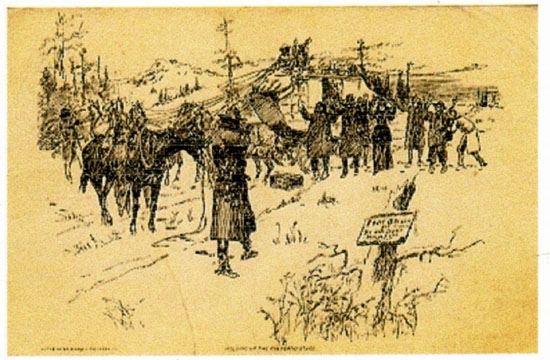
Holdup of the Overland Stage, C. M. Russell
Slade had served the Company as division superintendent, first in Julesburg,
replacing a French-Canadian,
Jules Beni, after whom the town was named, and later in
the Rocky Ridge Division. Beni was discharged when a new general superintendent, Benjamin F. Ficklin (1827-1871), discovered that
Beni was stealing from the Company. Ficklin, a Virginian, allegedly had killed two men prior to his
becoming general superintendent and had earlier been a rough and tough freighter on the plains. He served in both the
Albert Sidney Johnston expedition to Utah and the Lander Expedition. He allegedly voiced the
opinion that a man going on the Plains should never wash his face till he comes off again.
Frank Root and William Connelly in their 1901 The Overland Stage to California: Personal
Reminiscenses and Anthentic History of the Great Overland Stage Line and Pony Express From the Missour River
to the Pacific Ocean indicate that Slade was brought in by Ficklin as part of a "general 'cleaning up'" of the line from
theives who were "congregated along the route and were systematically preying upon the
company's property." Slade, when sober, was the perfect gentlemen, but
when besotted could be somewhat belligerent and was one not to readily forgive
slights. After Jules was dismissed, differences,
arose between the two which resulted
in each shooting and seriously wounding the other. Slade supposedly vowed that he
would have Jules' ears. Jules departed the area.
Months later, Slade was returning from the Pacific Springs Station when he received
word that Jules Beni was in the area. Some of Slade's employees captured Jules and took him to the Rocky Ridge Station, binding
him to a post in the station's cattle-yard. There, Slade would periodically, through the night,
stick his head out the door and take pot shots
at Jules, nicking him. In the morning Slade finally dispatched Jules, cutting off his ears and
turning one in to a watch fob and the other into an 1860's version of a worry stone.
Jules, himself, may not have been so innocent. Eugene Ware, a young captain in the military serving
in the area, later wrote:
On the south side of the South Platte, perhaps about a mile east of
the mouth of "Lodgepole Creek," a Frenchman by the name of Jules had
started a trading-post. The place was a great Cheyenne crossing-ground
going north and south, and a frequent place of Cheyenne rendezvous.
It was also much used by the Sioux. The Cheyennes had a great liking
for the country on the South Platte at the mouth of Lodgepole, and had
had camps there for many years. Jules was said to be a half-breed
French-and-Indian trader, and to have established this post for the
purpose of trading with the Cheyenne Indians. It was said his name was
Jules Beni but everybody called him "Jules." He was a man of keen
native shrewdness, an exceedingly dangerous man, with a peppery,
fierce disposition. He had killed several persons, and had become
a great deal of a character in the country. A man who had known him
several years told me that Jules once killed two persons of local
celebrity, cut off their ears, dried them, and carried these four
ears in his pockets. That every once in a while he would take them
out and show them to somebody. They were great trophies, as he thought.
Mark Twain in Roughing It described, as a young lad, meeting Slade:
In due time we rattled up to a stage-station, and sat down to breakfast
with a half-savage, half-civilized company of armed and bearded mountaineers
, ranchmen and station employees. The most gentlemanly-appearing, quiet and affable
officer we had yet found along the road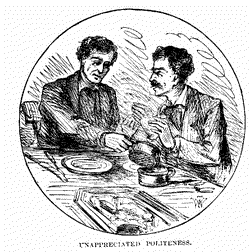 in the Overland Company's service was the
person who sat at the head of the table, at my elbow. Never youth stared and shivered
as I did when I heard them call him SLADE!
in the Overland Company's service was the
person who sat at the head of the table, at my elbow. Never youth stared and shivered
as I did when I heard them call him SLADE!
Here was romance, and I sitting face to face with it! -- looking upon it -- touching
it -- hobnobbing with it, as it were! Here, right by my side, was the actual ogre who,
in fights and brawls and various ways, had taken the lives of twenty-six
human beings, or all men lied about him! I suppose I was the proudest stripling
that ever traveled to see strange lands and wonderful people.
He was so friendly and so gentle-spoken that I warmed to him in spite of his
awful history. It was hardly possible to realize that this pleasant person
was the pitiless scourge of the outlaws, the raw-head-and-bloody-bones the
nursing mothers of the mountains terrified their children with.
Indeed, Slade insisted on personally refilling young Twain's empty coffee cup (copy of
original illustration above).
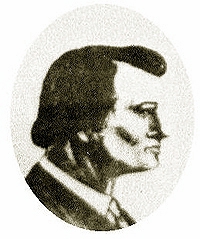
Joseph Alfred Slade
Ultimately, Slade's belligerency caught up with him. In Virginia City, Mont.,
the Committee on Vigilance, of which Slade was a member, took offense at his shooting
up the local saloons. When he refused service of a summons he was arrested. The
Committee, headed by one Paris S. Pfouts, the Town's founder,
first mayor and owner of the mercantile establishment, received advice from a corresponding
committee in Nevada City that the appropriate punishment was hanging. Accordingly,
on March 10, 1864, 11 days following Pfouts' installation as first Master of
the Virginia City Masonic Lodge, the Committee, most of whom were Masons, inducted
Slade at the end of a rope into a different type of lodge. The ceremony, held in the
corral across from Pfouts' store, was
conducted by standing Slade on a packing case, with the rope tied to a cross beam at the
corral entrance.
Slade's widow pickled his body in alcohol, kept it under her bed for several months,
before transporting it to Salt Lake City for reshipment for burial in Clinton County, Illinois, where Slade had been reared.
Unfortunately, arrangements for catching the stage to Illinois went awry. Slade's body was temporarily buried in Salt Lake City and still
awaits the east-bound stage.
The two principal sources for the story of Slade are Thomas Josiah Dimsdale's Vigilantes of
Montana (1865) and Nathaniel P. Langford's Vigilante Days and Ways (1890).
The two disagree as to whether Slade did a slow torturous killing of Jules (Dimsdale) or whether
Slade killed Jules quickly and justifiably (Langford). Langford adds one sadistic touch. Langford relates that after
anouncing to Jules his intent to shoot Jules, Slade told Jules:
"I will now, if you wish it, give you time to make your will."
Jules replied that he should like to do so; and a gentleman who was awaiting the departure of the coach,
volunteered to draw it up for him. The inconvenience of walking back and
forth from the corral to the station, through the single entrance in front
of the latter, made this a protracted service. The will was finally
completed and read for Jules. He expressed himself satisfied with it,
and the drawer of it went to the station to get a pen and ink, with which
he could sign it. When he returned a moment afterwards, Jules was dead.
Slade had shot him in the head during that temporary absence.
Both Dimsdale and Langford agree that Slade was a
perfect gentlemen when sober and belligerent when drunk. Professor Dimsdale wrote:
There are probably a thousand individuals in the West possessing a correct knowledge of
the leading incidents of a career that terminated at the gallows, who
still speak of Slade as a perfect gentleman, and who not only lament his
death, but talk in the highest terms of his character, and pronounce his
execution a murder. One way of accounting for the diversity of opinion
regarding Slade is sufficiently obvious. Those who saw him in his natural
state only would pronounce him to be a kind husband, a most hospitable host
and a courteous gentleman. On the contrary, those who met him when
maddened with liquor and surrounded by a gang of armed roughs, would
pronounce him a fiend incarnate.
There is also disagreement as to the location of Jules' demise. Twain puts it at
Rocky Ridge, a desolate, isolated station near present day Protsmans Knob. Langford puts it at
"Chansau's ranche" near Bordeaux's ranch. The reference to a stage station at Chansau's Ranch is probably
in error and most likely refers to Badeau's Ranch. Another source puts the location at
Cold Springs Station near present day Torrington. Langford indicates that Slade had advance dispensation
from military authorities at Fort Laramie. Dimsdale (1831-1866) was the first Montana Territorial
Superintendent of Public Instruction. Langford (1832-1911) was the first Yellowstone National Park
Superintendent.
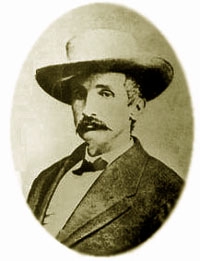
Benjamin Franklin Ficklin
The stage company did not necessarily disagree with
Jules' departure from the Land of the Living. Root and Connelly wrote that after Slade was wounded,
Superintendent Ficklin came by the station in the next stage to indicate that the first duty was to hang Jules, "after
which he drove on." Allegedly, Ficklin himself personally killed two miscreants. Ficklin also hired
John Scudder after Scudder, in order to avoid a murder charge, fled Denver to
Salt Lake City where Ficklin maintained his headquarters. Scudder was accused of murdering P. T. Bassett, one of
the directors of the Denver Town Company. In a cabin on Larimer Street, between 14th and 15th Streets,
Bassett threw a pick handle at Scudder, Scudder in turn shot Bassett. From the
effects of the shot, Bassett expired. Scudder returned to Denver a year later where a "people's court" found Scudder not
guilty by reason of self defense.
Ben Ficklin was a graduate of Virginia Military Institute, having been readmitted following service in the
Mexican War. Prior to the war, Ficklin had been dismissed from the Institute as a result of various infractions of the
school's rules. These included setting off fireworks under a reviewing stand, painting zebra stripes on the
school superintendent's horse, and smearing the door handle to a faculty room with "a quantity of filth."
[Writer's note: Students will be students and we sha'nt write of tunnels with power connections to
War Memorial Stadium.]
At the end of 1861, Ficklin gave notice and returned east, becoming a purchasing agent in England for the
Confederate Quartermaster General. At the end of the war, he was suspected and arrested for complicity in the
murder of President Lincoln, but released after several months. Ficklin moved to Texas and served as General Superintendent
of the San Antonio-El Paso Stage Line. Stage lines were very much dependent on
mail contracts with the government. Thus, it became necessary to lobby the federal government. In
1871 at the Willard Hotel in Washington City, Ficklin choked on a fish bone while having dinner.
An inept physician, in attempted to remove the bone, cut an artery. Ficklin was buried with
Masonic honors in
Charlotteville. After his death, Concho Station, Texas, was re-named after him. In August 1882, the
entire town, except the courthouse and jail, washed away in a flood.
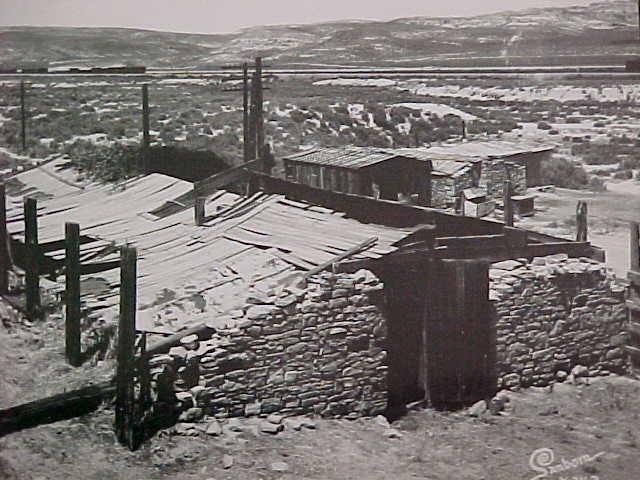
Point of Rocks Station
Another view of the stage station. Both this and
the view at the top of the page are by Sanborn Souvenir Co., Denver.
Next page: Deadwood Stage.
|